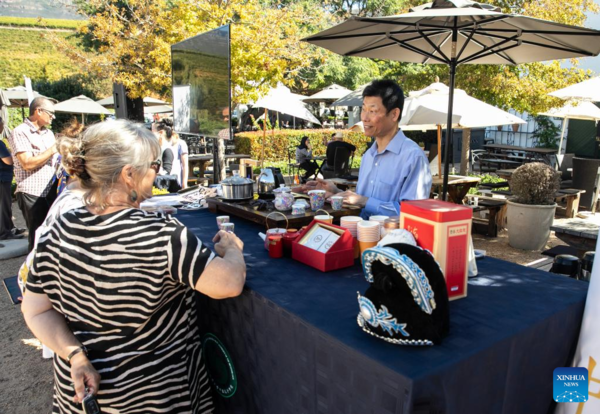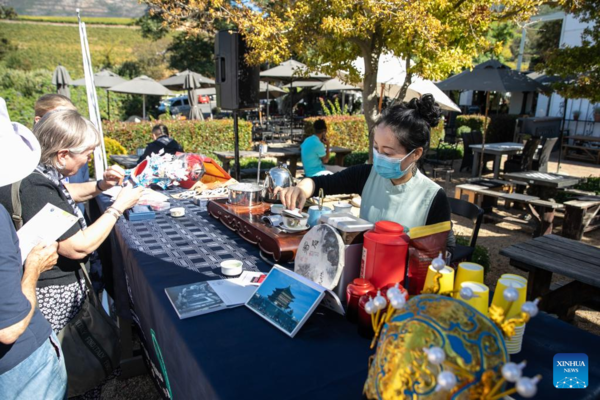Chinese Tea Meets South African Wine on UN Chinese Language Day
 |
| A teacher of the Confucius Institute for Chinese Medicine at University of Western Cape introduces Chinese tea to visitors at Groot Constantia wine farm in Cape Town, South Africa, on April 19, 2022. An educational partnership between China and South Africa on Tuesday brought Chinese tea culture to Cape Town's Groot Constantia, the oldest South African wine farm, to promote exchanges of cultures and celebrate UN Chinese Language Day. [Xinhua/Lyu Tianran] |
CAPE TOWN, April 19 (Xinhua) — An educational partnership between China and South Africa on Tuesday brought Chinese tea culture to Cape Town's Groot Constantia, the oldest South African wine farm, to promote exchanges of cultures and celebrate UN Chinese Language Day.
Making tea and wine share similarities that they both need dedication, hard work and craftmanship, therefore the Confucius Institute for Chinese Medicine at University of Western Cape holds a tea event at a winery to boost exchanges of the two cultures, said the institute's director Zeng Liren, while making Chinese green tea for visitors.
The UN Chinese Language Day is observed on April 20 every year since 2010, celebrating the language's contribution to the world while encouraging more people to learn it.
April 20 marks the Guyu, Grain Rain or "Rain of Millet" in Chinese. The Guyu is sixth of the 24 solar terms in the traditional lunar calendar, the day when farmers start sowing.
Zeng, who is also a tea expert, explained that tea farmers in China produce one of the highest quality green tea around Grain Rain, which is another reason for the tea event.
The organizer provided Chinese tea of five major categories, including fresh green tea, and also introduced tea knowledge and the programs the institute offers. It also showcased ethnic costumes during the event.
"You can taste tea here today or go for lovely wine tasting, or have lovely food paring here, so it just adds to culture experience. I think it is a good idea," the winery's marketing assistant Karen Woodcock told Xinhua.
It's a lovely culture event, she said, adding that the linkups between the east and west as well as South Africa and China has been centuries.
The long-serving staff member of Groot Constantia said the wine farm, established in 1685, wants to keep itself authentically South African, but would like to add knowledge of the Chinese culture, which is part of its history, as its manor house has a lot of Chinese furniture and artifacts.
She also hoped more wines from the winery to be exported to China.
"During tasting it (tea) they told us about additional values, quality, background history and I found it was very interesting. And I think it reflects everything on Chinese culture as well, so I must say the whole experience, the tea tasting, is lovely, absolutely divine," said 21-year-old Dylan Matthew Smith from University of Stellenbosch, outside Cape Town.
Across South Africa, various activities have been planned for this year's Chinese Language Day. They were hosted by Chinese Embassy in South Africa and organized by Chinese language organizations.
 |
| A teacher of the Confucius Institute for Chinese Medicine at University of Western Cape prepares Chinese tea for visitors at Groot Constantia wine farm in Cape Town, South Africa, on April 19, 2022. An educational partnership between China and South Africa on Tuesday brought Chinese tea culture to Cape Town's Groot Constantia, the oldest South African wine farm, to promote exchanges of cultures and celebrate UN Chinese Language Day. [Xinhua/Lyu Tianran] |
(Source: Xinhua)
Please understand that womenofchina.cn,a non-profit, information-communication website, cannot reach every writer before using articles and images. For copyright issues, please contact us by emailing: website@womenofchina.cn. The articles published and opinions expressed on this website represent the opinions of writers and are not necessarily shared by womenofchina.cn.






.jpg)

 WeChat
WeChat Weibo
Weibo 京公网安备 11010102004314号
京公网安备 11010102004314号